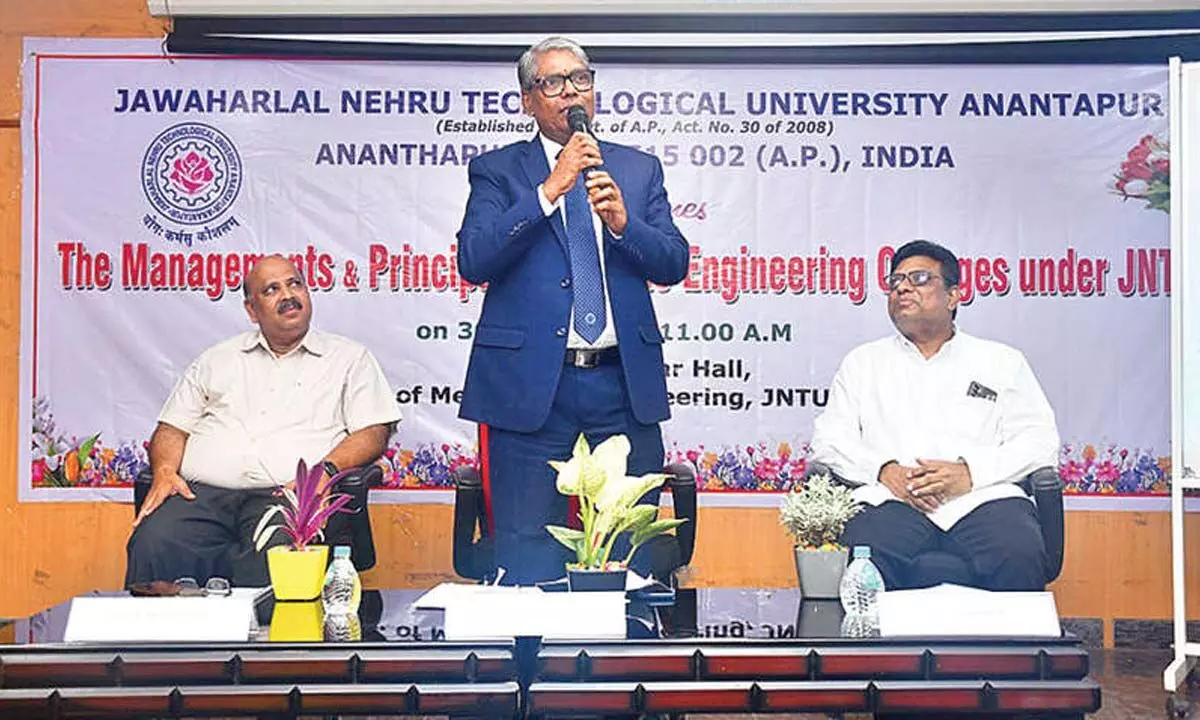Live
- BGT: 'Rohit is short of confidence with self-doubts', opines Manjrekar
- Gold gains 30 pc in 2024, silver 35 pc up on COMEX this year: MOFSL
- Delhi HC dismisses anticipatory bail plea of ex-IAS trainee officer Puja Khedkar
- Untouched Goa Beaches You Must Visit in January
- Muzigal launches its State-of-the-art Music Academy in Nallagandla, Hyderabad
- Thoughtful Christmas Gifts for Every Loved One
- South Korea: Finance minister silent on martial law probe amid speculation on acting president's role
- Karnataka Minister Laxmi Hebbalkar Vows To Pursue Justice Against CT Ravi
- Stands By Vijayaraghavan Amid Row Over Remarks On Gandhis
- Karnataka Legislative Council Chairman Denies Recording Controversial Exchange
Just In
Uniform R 23 regulations for all engg colleges in Andhra Pradesh


JNTUA Vice-Chancellor Prof G Ranga Janardhana speaking over the salient features of new R 23 regulations, in Anantapur on Sunday
Jawaharlal Nehru Technological University has organised a meeting with managements and principals of private engineering colleges from the nine districts under its jurisdiction over the salient features of new R 23 regulations being promulgated under the aegis of Andhra Pradesh State Council of Higher Education (APSCHE) that will come into force this year for all engineering courses across the state.
Anantapur: Jawaharlal Nehru Technological University has organised a meeting with managements and principals of private engineering colleges from the nine districts under its jurisdiction over the salient features of new R 23 regulations being promulgated under the aegis of Andhra Pradesh State Council of Higher Education (APSCHE) that will come into force this year for all engineering courses across the state.
Speaking on the occasion, JNTUA Vice-Chancellor Prof G Ranga Janardhana said that the regulations have been framed in consonance with the National Education Policy 2020 of Government of India by an expert committee constituted by APSCHE on behalf of state government consisting of experts from IITs & NITs, KV Krishnaiah, IIT Tirupati, NV Ramana Rao, NIT Raipur, and the Vice Chancellors of three technological universities in state, Prof G Ranga Janardhana, Vice Chancellor of JNTUA, Prof G V R Prasad Raju, Vice Chancellor of JNTUK & Prof K Venkata Subbaiah, Vice Chancellor of JNTUGV, Sri Srinath, IT Advisor, Government of Andhra Pradesh, Sridevi Sira, Academic Lead, NASSCOM, Prof V Sumalatha, Director of Academic & Planning, JNTUA, Prof Y Nazeer Ahammed, Secretary, APSCHE and headed by Chairman Prof Satyanarayana from IIT Tirupati.
As per the recommendations, this R 23 regulations shall be common to all engineering colleges either affiliated or autonomous across the state.
He said as per the suggestions of the State-level Committee, all engineering colleges in the state will have a common academic calendar and a course structure from this academic year.
Freedom is given to colleges in selection of verticals and electives. These R23 regulations will facilitate students to acquire a minor degree in addition to the degree he has opted into which will be referred to as major degree.
This minor degree can be across the branches and helps the student to get knowledge in an additional specialisation in addition to his basic degree.
The R 23 regulations have been designed such that the student can acquire this minor degree without need to study additional courses or credits by selecting open electives appropriately. Also, the students who are advanced learners can acquire B Tech (Hons) by registering and acquiring additional 15 credits in specialised courses in addition to the 160 credits of the B Tech programme.
Students with 7 CGPA can register for honours degree, he added and insisted that all colleges to conduct the induction programme for first year for a period of 3 weeks following the guidelines given by AICTE. He said this programme was meant for acclimatisation of the student to the new campus and make him feel at home. He said co-curricular activities such as sports, NCC, NSS, scouts and guides have been given due credit in the first year of engineering programme by allotting 1 credit for the same.
Vice Chancellors observed that to maintain workload balance for the teachers of first year, the University has grouped the branches under group I & II with courses appropriately scheduled in first and second semesters for two groups.
He also said that CSE and allied branches courses can be taught by core branch teachers, who have passed in at least two NPTEL courses pertaining to CSE as per the directions of All India Council for Technical Education (AICTE). But that number should not exceed 10 percent of the staff needed for teaching CSE and allied courses.

© 2024 Hyderabad Media House Limited/The Hans India. All rights reserved. Powered by hocalwire.com






